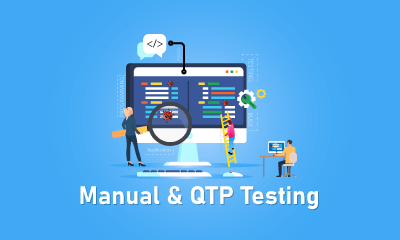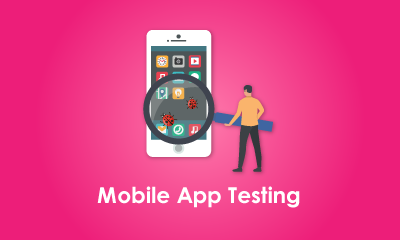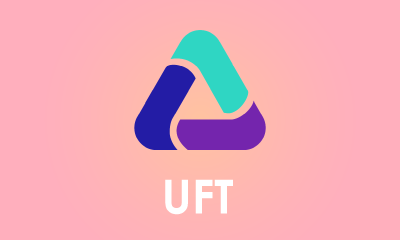- Home
- Blog
- ETL Testing
- Best ETL Tools

Today, data is the lifeblood of every industry. In the data-driven world, businesses organize their data and dig deeper into it to unlock valuable insights and identify hidden opportunities. They forecast their various business activities by performing thorough data analysis. It helps make informed decisions to drive businesses in the right direction.
The important thing is that you cannot use any business data directly. This is because the raw data won’t be in the desired format and quality for analysis and processing. So, you need to clean and transform the data into the desired quality and form. It allows efficient data analysis and helps to derive valuable insights from the data.
So, how will you gather data? How will you improve the quality of the data? How will you store the data? No wonder if these questions are coming up in your mind.
This is where ETL tools come in. The tools help to extract, transform, and load data. In other words, the tools perform the ETL process and let data analysts create data visuals, generate reports, retrieve helpful insights, etc., using Business intelligence tools.
Let’s jump into the blog to learn what ETL tools are, the top ETL tools, the uses of ETL tools, and many more in greater detail.
Table of contents:
What are ETL tools?
ETL tools are essentially software you can use to perform ETL processes on raw data. The tools gather data from multiple sources and then convert the data into clean and quality data. The processed data is then loaded into data lakes, databases, or warehouses.
ETL tools simplify ETL processes through automation. Know that various ETL tools are available in the market, and each one plays a pivotal role in performing ETL processes remarkably.
Well! This blog discusses the top ETL tools in-depth, which will assist you in choosing the right one for your business. Before diving deep into the top ETL tools, we will glance at the types of ETL tools in the following section.
| If you would like to become a ETL certified professional, then visit Mindmajix - A Global online training platform: "ETL Testing Certification Training" .This course will help you to achieve excellence in this domain. |
Types of ETL tools:
There are four types of ETL tools. Let’s look at them in detail.
-
Enterprise ETL tools
Generally, large enterprises deal with mountains of data. The enterprise ETL tools have key functionalities to gather volumes of data from various data sources. The tools perfectly schedule and automate ETL processes. They can make complex data transformations and load the data to destinations.
-
Open-source ETL tools
They are also called free ETL tools. These tools allow data analysts to perform their ETL processes quickly. Besides, they streamline managing data, making data integration, and loading data in warehouses effectively.
-
Custom ETL tools
Custom ETL tools offer greater flexibility to users, but at the same time, they demand much effort to create data pipelines. You can create data pipelines using Hadoop, Kafka, and Spark technologies.
Furthermore, you can design and build custom ETL tools using Java, Python, and SQL. To run them efficiently, you must perform continuous testing and maintenance for ETL tools.

-
Cloud-based ETL tools
The cloud-based ETL tools help to perform ETL processes in a cloud-based environment. Cloud service providers like Google Cloud Platform, Microsoft Azure, and AWS offer ETL tools for businesses to manage and explore their data.
Well! You have got to know the different types of ETL tools. Next, you will go through the top ETL tools in the following section. You will learn the nature of the ETL tools and their key features elaborately.
Let’s get ready!
Top ETL Tools:
1. Oracle Data Integrator
Oracle Data Integrator is a powerful data integration platform with which you can easily manage high-volume and event-driven integration processes. This tool also handles high-performance batch loads and SOA-enabled data services.
Oracle Data Integrator supports all data integration processes, such as data movement, management, synchronization, etc. It helps to perform consistent and quality ETL processes.
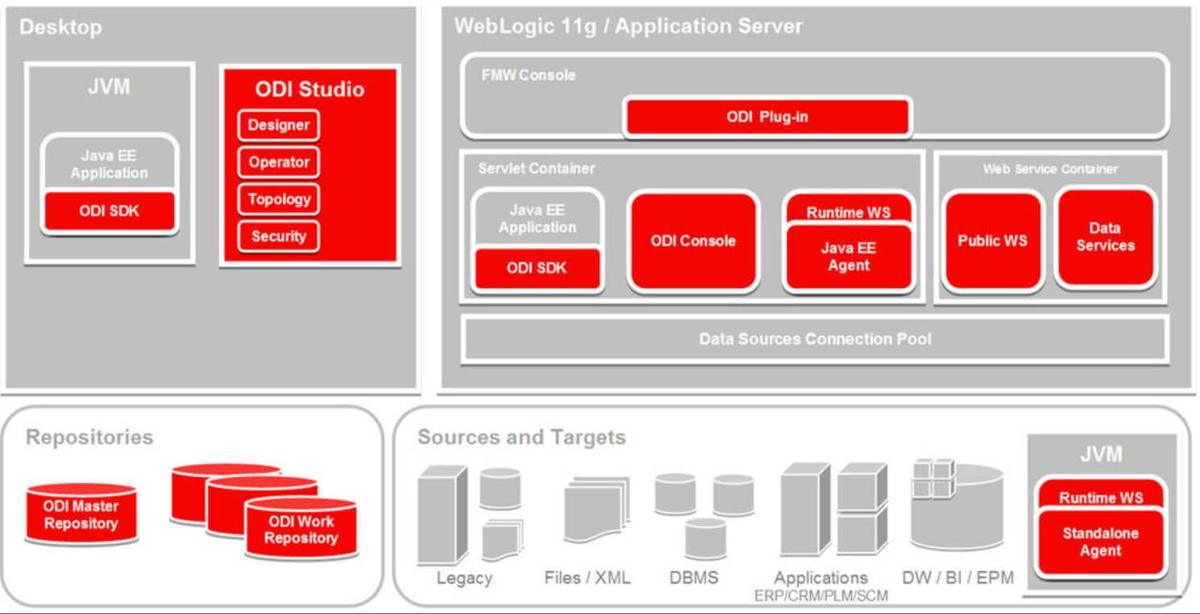
Key features:
- supports event-based, data-based, and service-based data integration
- eliminates data silos and unifies data efficiently
- provides high-performance ETL processes, hot-pluggability, and modularity,
- provides the advanced Changed Data Capture (CDC) framework to process events in real-time
- offers robust data integrity control features
2. Azure Data Factory
Azure Data Factory is a serverless and fully managed data integration platform. It allows integrating data using over 90 built-in connectors. You can perform both ETL and ELT processes with Azure Data Factory. Here, ELT represents the Extract, Load, and Transform operations. Azure Data Factory offers the tool - Azure Synapse Analytics - to derive insights from the integrated data.
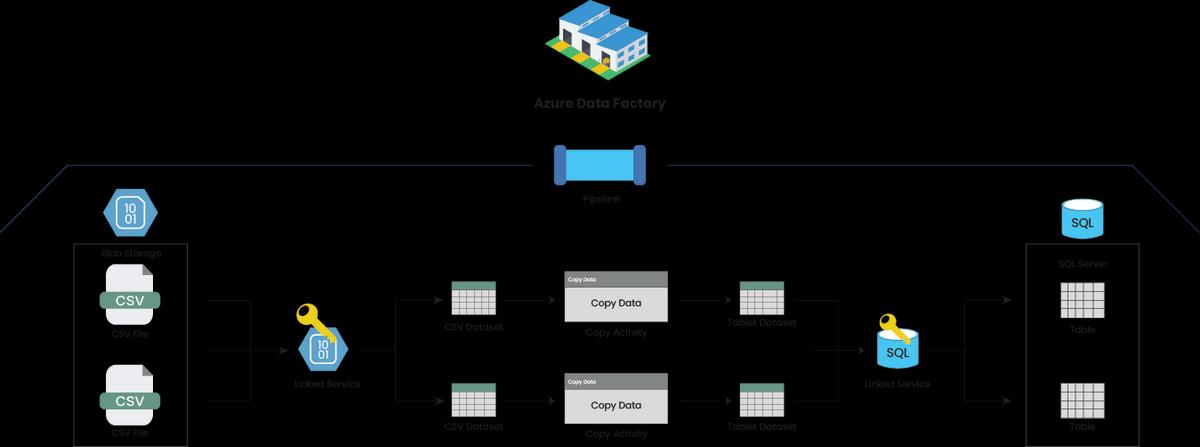
Key features:
- simplify data migrations
- supports Continuous Integration (CI) and Continuous Delivery (CD)
- provides code-free data flows to speed up data transformation
- offers intelligent-driven mapping to automate copy activities
[Read More Microsoft Azure Data Factory]
3. Hadoop
Apache Hadoop is an open-source ETL tool that assists you in processing massive amounts of data. No matter whether it is Gigabytes or Petabytes of data, Hadoop can quickly process them. The main thing about this ETL tool is that it creates many server clusters. So you can store data in multiple clusters and process them simultaneously. Hadoop simplifies data processing, saves time, and thus enhances productivity.

Key features:
- supports distributed data processing
- adapts simple programming models
- offers greater scalability, allowing servers to scale up from single to thousands
- detects and prevents failures at the application layer, providing highly available services
- provides excellent local storage and computation options.
4. Fivetran
Fivetran is a powerful, automated data movement platform. It offers key features such as automated schema drift handling and data normalization. Fivetran supports the seamless movement of high volumes of data with low latency and low impact. Besides, it centralizes structured and semi-structured data, which simplifies generating insights.
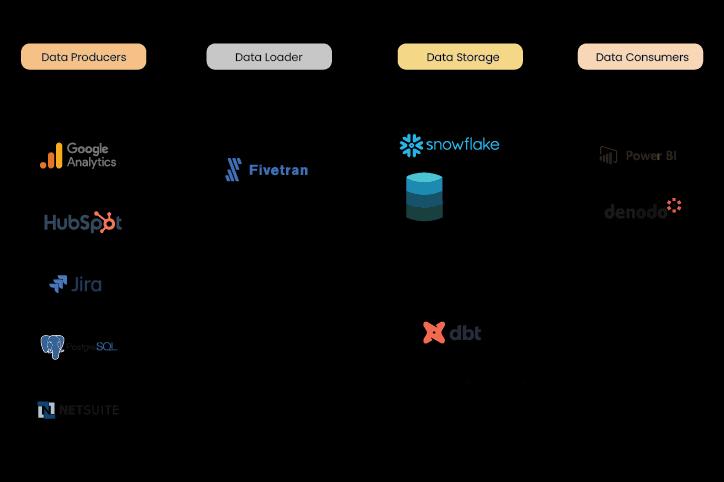
Key features:
- connects with more than 400 prebuilt source connectors
- doesn’t slow down systems due to high-volume data movement
- provides enhanced transparency and security in data movement
- allows loading event-based data in destinations
- supports destination-to-destination data movement.
5. Stitch
Stitch is yet another enterprise-level cloud ETL platform with which you can move data from sources to destinations in no time. This tool provides automated cloud pipelines that help to unlock insights from the integrated data quickly. Stitch pipelines are automatically updated, reducing the burden of IT infrastructure management. This ETL tool is helpful in critical analytics applications because of its advanced security features.

Key Features:
- reduces complex coding and queries to manage data
- supports popular data warehouses like Snowflake, Amazon Redshift, Google BigQuery, etc.
- allows extracting data from over 140 sources without coding, such as MySQL, Salesforce, MongoDB, Zendesk, etc.
- offers a user-friendly interface and ready-to-query schemas
- complies with HIPAA compliance, SOC2, and SSH tunneling to secure data pipeline.
6. AWS Glue
AWS Glue is an efficient serverless data integration ETL tool. The great thing about the tool is that it offers simple and quick data integration. This tool allows you to connect with over 70 data sources and manage data in a unified data catalog. You can create, execute, and monitor ETL pipelines using AWS Glue, simplifying loading data in data lakes.
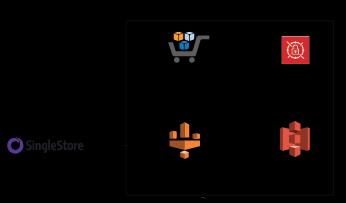
Key features:
- provides automatic provisioning for infrastructure management
- connects with cloud and on-premises data quickly
- provides both visual and code-based user interfaces
- comes with an in-built Machine Learning(ML) ability that detects duplicate copies of data and removes them
7. Pentaho
Pentaho is one of the modern data integration tools. It seamlessly connects with edge, cloud, and on-premises data sources. Pentaho provides high-performance transformation engines to blend and visualize data. Pentaho’s data orchestration tool simplifies managing rapidly growing data volume and complexity in the analytic data pipelines.
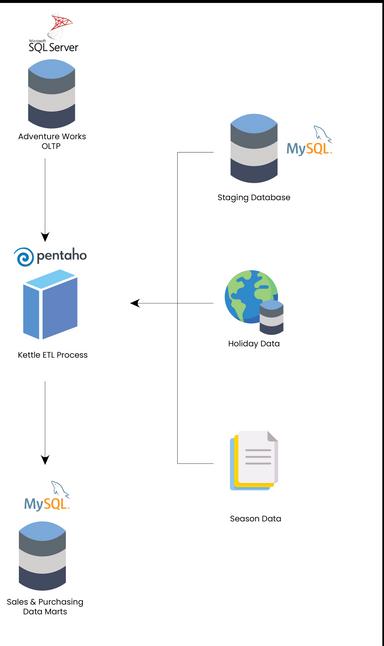
Key features:
- offers an easy drag-and-drop interface
- supports data movement across hybrid cloud environments
- switches between the native kettle and spark engines
- allows reusing the same transformations for multiple projects
- employs customized reporting and dashboarding
8. Matillion
Matillion is a code-optional ETL tool that accelerates building data pipelines with little or no code. The low-code designer of Matillion helps you to perform complex data transformations. You can monitor all the data pipelines through a single window. This ETL tool prepares data, making it convenient for BI tools to process data.
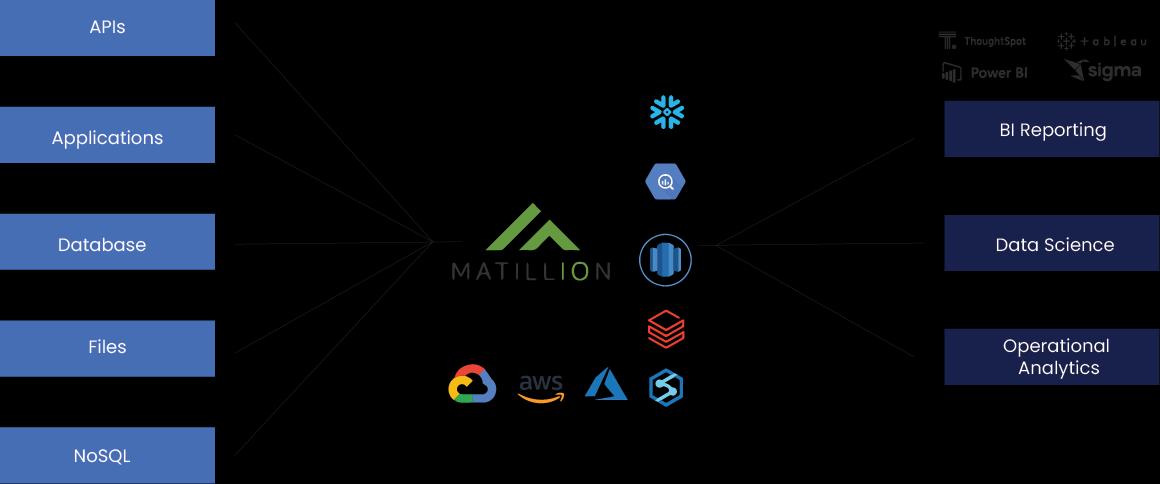
Key features:
- provides hundreds of connectors to load data quickly
- comes with an intuitive interface that can scale seamlessly
- supports collaboration using Git
- performs push-down integration to achieve optimum performance
- supports data warehouses such as Amazon Redshift, Databricks, and Google BigQuery.
9. Informatica Power Center
Informatica Power Center is a robust cloud-based ETL tool that supports businesses in processing complex data effortlessly. It is an AI-powered ETL tool that helps to manage any workload, data, and data pattern on a single platform. Informatica Power Center assists companies in establishing a consistent data source to view and analyze the data easily.
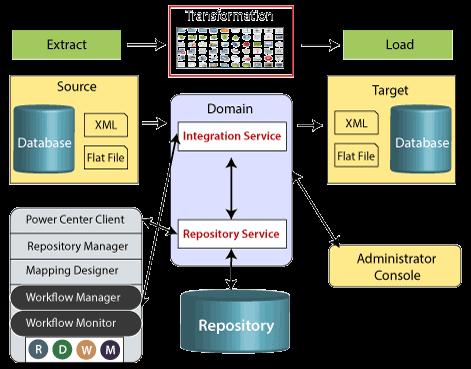
Key features:
- works based on Service Oriented Architecture (SOA)
- maintains the Informatica metadata
- creates maps between data sources and data warehouses using Informatica designer
- create workflows using workflow manager and manage them using workflow monitor
- comes with prebuilt data transformation methods that transform data in no time
[Learn Informatica PowerCenter]
10. Talend Open Studio
Talend Open Studio is an open-source ETL tool with which you can execute basic ETL and data integration processes. You can build basic data pipelines, create graphical profiles of data, and manage data in a powerful integration environment. Talend Open Studio offers easy drag-and-drop tools to develop ETL processes rapidly.
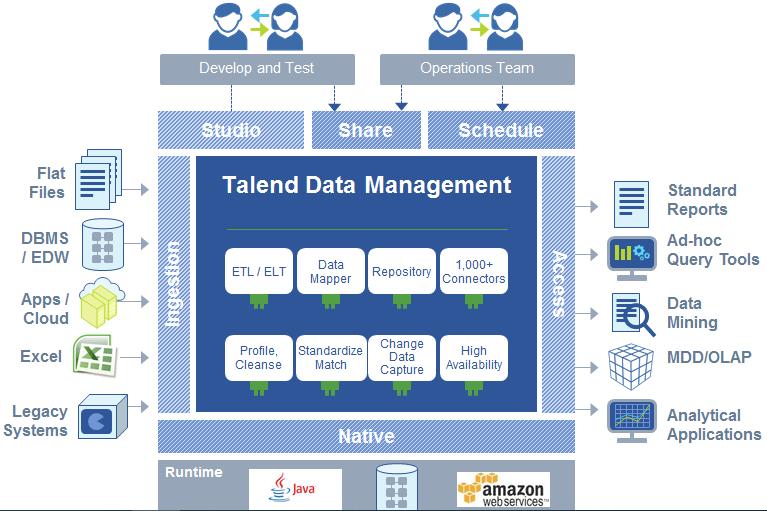
Key features:
- boosts productivity with reusable jobs and robust scheduling
- enables automated documentation
- support on-premise, cloud, and hybrid data integration
- leverages SaaS apps, RDBMS connectors, and packaged apps
- loads data in data warehouses such as Databricks and Snowflake
11. Microsoft SSIS
Microsoft SSIS stands for Microsoft SQL Server Integration Services. It is an effective integration platform that manages integration services packages. It supports managing enterprise-level data, cleansing and mining data, and loading data in multiple destinations. With Microsoft SSIS, you can perform seamless ETL processes such as managing SQL server objects, copying and downloading files, and more.
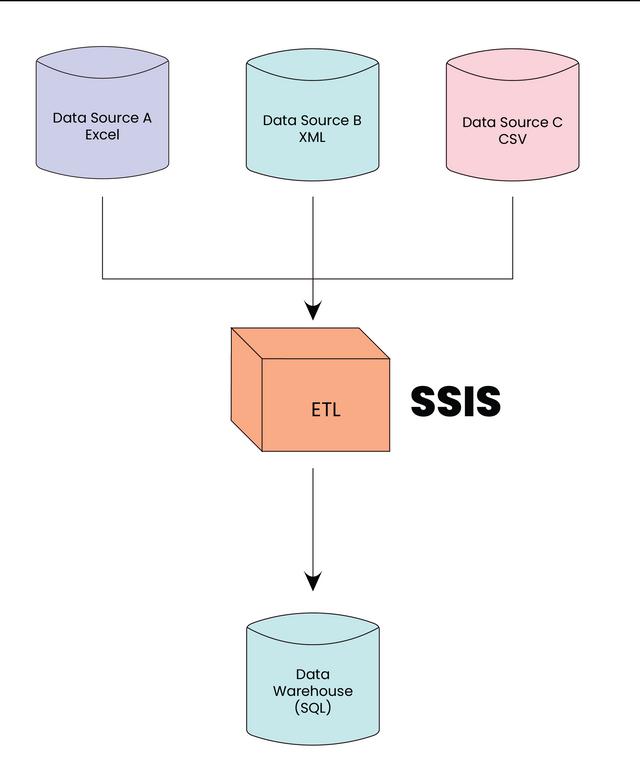
Key features:
- supports extracting XML data files, relational data sources, flat files, etc.
- comes with a rich set of graphical tools to create packages.
- assists in storing, executing, and managing packages with the SSIS catalog database consistently
- starts and stops locally stored packages. Similarly, start and stop the packages stored in the remote.
- supports connecting with multiple integration service servers.
12. Apache NiFi
Apache NiFi is a robust integrated data logistics platform that automates data movement between disparate data sources. It is a highly reliable and configurable ETL tool. Apache NiFi offers a FlowFile processor that helps simplify data routing and transformations between systems. Besides, you can visualize data flow using this tool.
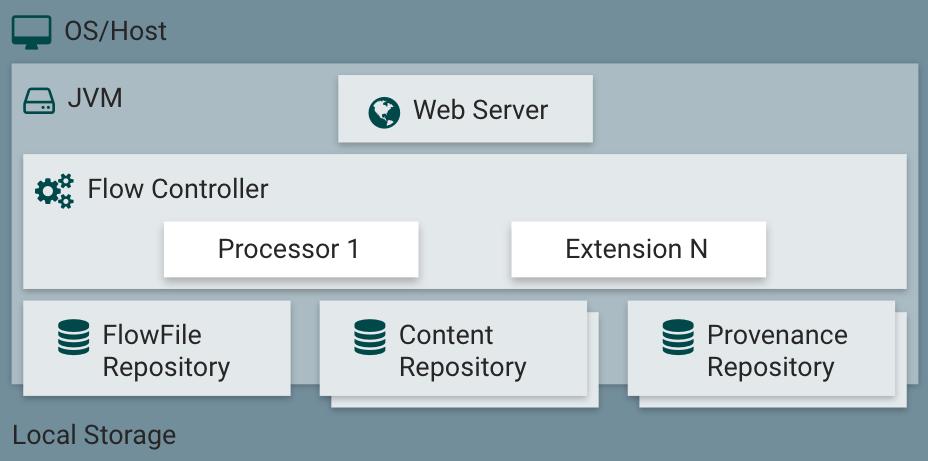
Key Features:
- provides a browser-based user interface
- provides data provenance tracking that helps to track data from end-to-end
- performs multi-tenant authorization and policy management
- offers a Flow Controller that acts as the mediator to exchange FlowFiles between processors
- supports buffering for all queued data
13. Skyvia
Skyvia is a cloud-based data integration platform. The big plus about this ETL tool is that It doesn't require coding skills. So, professionals with no coding skills can manage data integration effortlessly. Skyvia provides excellent scalability so businesses of any size can perform data management efficiently.
Key features:
- supports on-premises and cloud platforms
- allows transferring business data between cloud apps automatically
- uses an intuitive visual query builder to manage any data from browsers.
- integrates with multiple cloud applications, CRMs, databases, and data warehouses
- supports multi-tenant and fault-tolerant cloud architecture, so Skyvia is highly available and reliable.
14. Dataddo
Dataddo is yet another data integration platform. It is a no-code platform that supports ETL as well as REVERSE ETL processes. It is a SOC 2 Type II certified tool. Also, it complies with major privacy laws and global standards like ISO 27001. The main thing about Dataddo is that it connects applications to business intelligence tools and vice-versa.
Key features:
- supports sending data from any application to dashboarding apps like Power BI, Tableau, etc.
- helps transfer data from applications to data warehouses, between warehouses, and warehouses to applications.
- comes with an easy-to-use interface through which you can connect data.
- provides flexible user management.
- allows adding custom connectors with dashboards.
15. Integrate.io
It is a no-code ETL data pipeline platform. It allows managing data with a powerful drag-and-drop interface. It centralizes data that provides a single source of truth.so you can generate reports quickly. Integrate.io provides visualized data pipelines for workflows across multiple data sources and destinations. Note that workflows are usually automated in integrate.io.
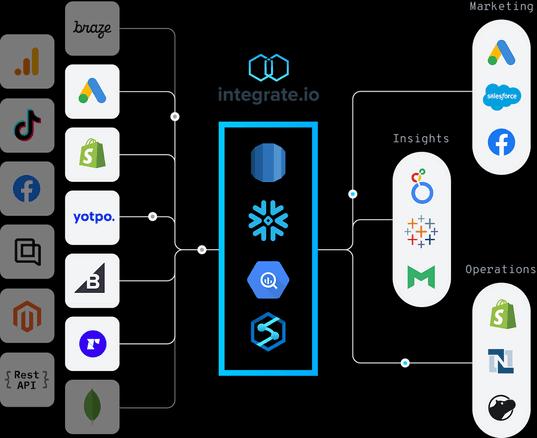
Key features:
- connects with over 150 data sources and destinations
- provides excellent scalability for the entire data journey
- connects with relational databases such as Heroku Postgres, Google Cloud SQL, MySQL, etc.
- supports cloud storage, such as Amazon S3 and Google Cloud storage.
Great! You have gained a comprehensive overview of the top ETL tools and their features. Next, we will jump into the summary of the article.
Summary:
- ETL is the process of gathering, transforming, and loading data in destinations
- The data destinations can be data warehouses, databases, and data lakes.
- ETL tools perform the process of ETL process and let the data for analytics and other data processing
- ETL tools provide good reliability, scalability, and security to the data being processed
- BI tools and dashboards can be connected with ETL tools for data analysis and exploration.
ETL Tools FAQs:
1. What is ETL?
ETL is the process of collecting, transforming, and loading data in destinations. The destination can be databases, data warehouses, and data lakes. In the ETL process, data is extracted from various sources and converted into clean data so that it can be used for data analysis and storage.
2.How do you choose the right ETL tool?
- The ETL tool that you select must correctly fit your use case
- The tool should be scalable based on the business needs
- It should handle errors effectively.
- It should provide data consistency and accuracy.
- It should offer better performance irrespective of changing volumes of data.
3.What is the key difference between ELT and ETL?
- ELT stands for Extract, Load, and Transform. On the contrary, ETL stands for Extract, Transform, and Load.
- ETL process transforms data and then loads it on destinations. On the other hand, the ELT process directly loads data into destinations.
- ETL process mainly supports loading structured data. On the other side, the ELT process supports loading all types of data.
4.What is the key difference between ETL and reverse ETL?
ETL process loads data in warehouses from data sources. On the contrary, reverse ETL loads data into applications from data warehouses or data lakes. Both methods use batch processing for data transfer. ETL process is used for power analytics, whereas reverse ETL is used in power data activation.
5.Is SQL an ETL tool?
No, SQL is not an ETL tool. SQL is a query language, whereas ETL is a process. We use SQL to query data that is already stored in relational databases. On the other hand, we use the ETL tool to extract data from data sources, transform the data, and load them in data warehouses.
Conclusion
At a glance, ETL tools help to extract data from sources, convert them into clean and quality data, and load the data in destinations securely. Mountains of data can be handled automatically with the help of ETL tools. This blog might have helped you get glimpses of ETL tools in terms of their nature and key features.
If you want to explore more ETL tools, you can check out courses in MindMajix. It will help you to get a comprehensive understanding of ETL tools and hands-on skills. If you have suggestions, mark your thoughts in the comment box below.
 On-Job Support Service
On-Job Support Service
Online Work Support for your on-job roles.

Our work-support plans provide precise options as per your project tasks. Whether you are a newbie or an experienced professional seeking assistance in completing project tasks, we are here with the following plans to meet your custom needs:
- Pay Per Hour
- Pay Per Week
- Monthly
| Name | Dates | |
|---|---|---|
| ETL Testing Training | Feb 28 to Mar 15 | View Details |
| ETL Testing Training | Mar 03 to Mar 18 | View Details |
| ETL Testing Training | Mar 07 to Mar 22 | View Details |
| ETL Testing Training | Mar 10 to Mar 25 | View Details |

Madhuri is a Senior Content Creator at MindMajix. She has written about a range of different topics on various technologies, which include, Splunk, Tensorflow, Selenium, and CEH. She spends most of her time researching on technology, and startups. Connect with her via LinkedIn and Twitter .







